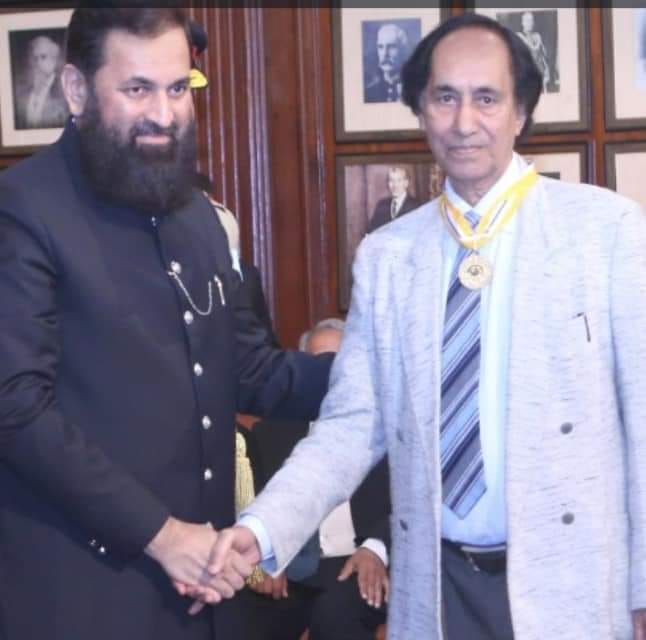Transformative Voices in Pakistani Politics: A Deep Dive with Sania Kamran
Waqas Walana Podcast With Sania Kamran
In a comprehensive discussion that reveals the intricate workings of Pakistan's political machinery, Sania Kamran, a seasoned political figure who has navigated the complex terrain from Pakistan Tehreek-e-Insaf (PTI) to the Pakistan People's Party (PPP), has provided unprecedented insights into the challenges and transformations shaping the country's democratic landscape. Her conversation with host Waqas Malana offers a rare glimpse into the internal dynamics of major political parties and the broader implications for Pakistan's political future.
Ms. Kamran's analysis begins with a stark assessment of PTI's organizational structure during its most influential years. She characterizes the party as fundamentally flawed by what she terms a "one-man show" approach, where Imran Khan's overwhelming dominance created an environment that paradoxically discouraged the very intellectual engagement the party claimed to champion. This centralization of power, according to Kamran, created a culture where educated individuals and potential thought leaders found themselves systematically marginalized despite their genuine desire to contribute meaningfully to the party's mission and Pakistan's political discourse.
The implications of this leadership style extended far beyond simple organizational inefficiency. She explains that the concentration of decision-making authority in a single individual effectively stifled innovation and creative problem-solving within the party ranks. Those who attempted to rise to positions of influence often encountered resistance and suppression, creating a paradoxical situation where a party that attracted intellectuals and idealistic young people simultaneously prevented them from exercising their capabilities. This structural limitation, she argues, ultimately weakened the party's ability to adapt, evolve, and respond effectively to the complex challenges facing Pakistan.
Ms. Kamran's personal political journey serves as a compelling case study in the dedication and persistence required to achieve meaningful influence in Pakistani politics. Her story begins as a university student engaged in fundraising activities for Shaukat Khanum Hospital, demonstrating how political involvement often emerges from civic engagement and social responsibility. Over fifteen years with PTI, she methodically built her political capital through grassroots organizing, starting at the block level and working her way through increasingly responsible positions.
This bottom-up approach to political advancement illustrates an important aspect of Pakistani politics that often goes unrecognized. Unlike systems where political careers can be launched through connections or appointments, Kamran's experience demonstrates that lasting political influence in Pakistan typically requires years of community-level engagement, relationship building, and demonstrated commitment to constituent service. Her progression from student activist to Additional General Secretary represents not just personal achievement, but a model of how political leadership can emerge from genuine community engagement.
The constraints she experienced within PTI's organizational culture ultimately led to her decision to transition to the PPP, a move that represents more than simple party switching. Kamran describes finding within the PPP an environment that offers greater intellectual freedom and opportunity for authentic political expression. This contrast highlights fundamental differences in how political parties can structure internal democracy and accommodate diverse perspectives.
Within the PPP framework, Kamran reports experiencing what she characterizes as liberation and relaxation, suggesting that the party's organizational culture allows for more natural expression of political views and greater autonomy in pursuing policy initiatives. This difference in organizational climate has significant implications for how political parties can attract, retain, and effectively utilize talented individuals who might otherwise become frustrated with restrictive internal environments.
The generational dynamics within Pakistani politics emerge as another critical theme in Kamran's analysis. She identifies a fundamental disconnect between the country's predominantly young population and its political leadership, which often consists of individuals in their forties and fifties who may lack direct understanding of contemporary challenges facing younger Pakistanis. This demographic mismatch creates what she sees as a representation crisis, where policy decisions are made by individuals who may not fully grasp the aspirations, concerns, and lived experiences of the majority of Pakistani citizens.
This generational gap extends beyond simple age differences to encompass broader questions about political opportunity and advancement. Kamran advocates for structural reforms that would create more accessible pathways for younger candidates to assume meaningful leadership roles, rather than requiring them to wait for decades before being considered for significant positions. The current system, she suggests, risks alienating the very demographic that could bring fresh perspectives and innovative solutions to Pakistan's persistent challenges.
Kamran's role as the first Parliamentary Secretary for Women Empowerment provides her with unique insights into gender dynamics within Pakistani politics. Her experience illustrates both the possibilities for women's political advancement and the ongoing challenges they face in balancing family responsibilities with political careers. Her legislative vision encompasses comprehensive frameworks for women's economic and social empowerment, moving beyond symbolic representation toward substantive policy changes that could improve conditions for women throughout Pakistani society.
The comparative analysis between PTI and PPP that emerges from Kamran's discussion reveals important insights about organizational health and internal democracy within political parties. She describes PPP's leadership, particularly under Bilawal Bhutto Zardari, as more accommodating of diverse perspectives and internal debate. This organizational openness creates what she sees as a healthier environment for political development and policy formation, contrasting sharply with the more restrictive atmosphere she experienced in PTI.
This difference in organizational culture has broader implications for democratic governance in Pakistan. Political parties that foster internal democracy and encourage diverse viewpoints are likely to be more effective at representing their constituents and developing innovative policy solutions. Conversely, parties that suppress internal debate may find themselves less adaptable and less responsive to changing political circumstances.
The conversation also addresses the broader challenge of political polarization in Pakistan, which Kamran identifies as a significant obstacle to effective governance. She notes that PTI's culture discouraged engagement with opposition parties, a practice she views as fundamentally detrimental to democratic governance. In contrast, she praises the PPP's emphasis on dialogue and cooperation, viewing this approach as essential for addressing the complex challenges facing Pakistan.
This difference in approach to political opposition reflects deeper philosophical differences about how democracy should function. Kamran's preference for collaborative approaches suggests a belief that effective governance requires the ability to work across party lines, particularly on issues of national importance such as economic development, security, and social progress. The alternative approach, characterized by rigid partisan divisions, may hinder the kind of policy coordination necessary to address complex national challenges.
Kamran's assessment of current political leadership provides insights into the evolving dynamics within Pakistan's major political parties. She acknowledges the efforts of figures like Maryam Nawaz, whom she recognizes as working diligently as Punjab's first female Chief Minister, and Bilawal Bhutto Zardari, whom she credits with having a clear democratic vision. These observations suggest a recognition that effective political leadership can emerge from multiple parties and that the health of Pakistan's democracy depends on having competent leaders across the political spectrum.
The broader implications of Kamran's analysis extend to fundamental questions about the future of Pakistani democracy. Her emphasis on the need for intellectual space within political parties, meaningful youth inclusion, and enhanced women's participation points to areas where systemic reforms could strengthen democratic institutions. These changes would require not just individual political parties to modify their internal practices, but broader cultural and structural shifts in how Pakistani society approaches political participation and leadership development.
Kamran's vision for Pakistan's political future centers on inclusive governance that can effectively harness the energy and perspectives of young people while maintaining respect for democratic institutions and processes. This approach, she argues, is essential not only for domestic governance but also for strengthening Pakistan's international standing and its ability to address regional and global challenges effectively.
The discussion ultimately suggests that Pakistan's political evolution depends on its ability to create space for diverse voices, encourage meaningful intellectual debate, and provide genuine opportunities for the next generation of leaders to shape the country's direction. Kamran's journey from PTI to PPP illustrates the ongoing search by committed political actors for platforms that allow them to contribute meaningfully to Pakistan's democratic development, suggesting that the health of the country's political system may depend on its ability to accommodate and nurture such dedicated individuals.


No comments yet.